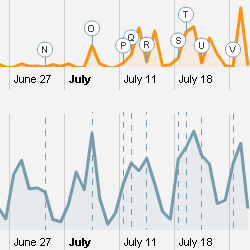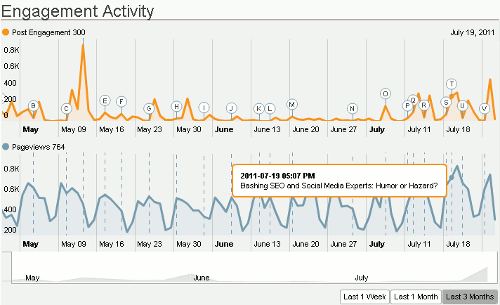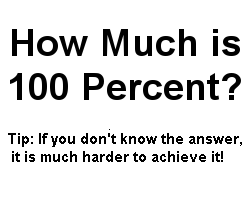
One great benefit of social media is the ability to communicate with others in the format and space they want to communicate. Some people will choose to discuss a topic on Facebook, while others choose LinkedIn, Twitter, Digg, Reddit, Amplify, or a squillion others. Many people will pick a handful of networks to focus their attention, based on their interests or their intended audience, and monitor them vigilantly. Google+ is climbing the ranks of preferred networks very quickly!
Blog readers and writers take note: You probably don’t notice this challenge much from a reader standpoint, but if you are a blogger who is paying attention to where your content is being discussed, you probably see this all the time. Do you ever notice that there are comments in about 37 different contexts spread across a handful of networks, all related to a single blog post?
As a blog article spreads, it is threaded into a lot of places with a lot of different conversations. Although they usually include a link back to the original article, very few of those outside conversations really do a good job of connecting the audience to the central conversation, or vice versa. After all, those comments somewhere else are seldom seen by the people reading the article, so they don’t get the benefit of those other peoples’ thoughts and opinions … and it squelches opportunities for them to network together with those other like-minded people. Sometimes that is a real shame.
It is great when your article is being shared and discussed. It would be foolish to discourage it, but when the conversation … the very genesis of the topic … begins with a blog article, it can also have some downsides. The message can become very muddled, and the conversations often stray far from the original topic. I have seen it a squillion times that the conversations do not even touch on the topic of the original blog article beyond the headline or description.
Again, this can be great in some ways. The evolution of a topic can be fascinating as it is morphed through enough various groups’ brain filters. However, even in the best scenario that it does not lose all of the author’s well-crafted thought provoking intent, this can still lead to a pretty messy challenge for the originator to keep up with the many conversations. When it comes to blogs, either reading them or writing them, those opinions count. Sometimes the best part of a blog article is in the comments that build upon the topic.
Native Blog Comments vs. Off-Blog Comments
When conversations are broken apart, each of the individual discussions will often lose a lot of the best and most well thought out responses from the smartest and most worthwhile participants. Also, as I already mentioned, it significantly discounts many opportunities for others with like minds to network together.
In the end, let’s face it … more people are going to see the original article in its native environment than they will on any given reader’s Twitter, Facebook, LinkedIn, or Google+ profile. With that in mind, if you really have something to say, you will do the author, yourself, and other readers a much greater service by including your comments on that blog article. Best of all, your comment is usually just as convenient, and can often even be shared in duplicate, with a single click, to your other social networks if you should choose. That way, others can see what you thought of the topic even before they go and read the article.
Some social networks have helped to make accommodations for this challenge, but others still have some work to do. I am hopeful that this will be a part of future Google+ improvements.
An example of a huge leap forward toward connecting blogs with outside conversations was in Facebook comments, which allow for comments to be shared both on the originating blog and on Facebook simultaneously. This is one way I think that Facebook is still whipping Google+ in a huge way, although I expect that to change.
Similarly, Disqus does a fantastic job of connecting conversations across networks, although it could still be better at pulling in off-blog comments with higher accuracy. BackType used to fit this need by bringing in conversations from all over the place, but they kind of wrecked that system in favor of other money-making hopes.
If you are not familiar with the usage and benefits of Facebook comments, there is more about the platform in my earlier article titled “How to Add Facebook Comments to a Blog and Improve Search Ranking“. If you are not familiar with Disqus, you may enjoy the article titled “Why Disqus May Be The Best Social Network of 2011“.
In any case, I think that making a greater connection with those off-blog comments is a responsibility of the blog owner, and should always be taken seriously. There are a lot of ways to monitor those conversations, and none of them are a perfect magic bullet. It takes a lot of attention, but should not be overlooked.
Google+ vs. Blog Comments
Google+ is an excellent platform. I really like it for many reasons, and not the least of which is the high level of interactivity that I have encountered there. It seems that people are really enjoying a lot of conversation on Google+.
Of course, some of that active engagement may be because it is still a bit of a novelty. It could also be that, although it is a much different type of platform, people are seeing it as a chance for a “do-over” by handling it differently than they handled their Twitter or Facebook. Whatever the case, it seems to me that people are using it in great ways, and it is far less spam-riddled and spam-prone than many other networks.
Sadly, Google+ also poses a greater challenge for monitoring and participating in the outside conversations about your topics. I hope it will change, but in the meantime, I think it is worth being aware and attentive to as many as possible.
What Makes Sense to You?
It is an extreme example, but do you ever see a comment on an outside network about a blog article and it shows without a doubt that the person responding did not even give a passing glance at the original context, beyond the headline? It could frustrate the originating author, but for me, I mostly just chock it up to another brainiac trying to sound smart without the will to actually be smart. You know, like reading beyond the headline before replying. Yes, this is an extreme example, but here is something I find to be common: comments directly on a blog will nearly always be more on-topic and more beneficial to the community.
The greatest variable across all of this wonderful technology is you. Nobody is going to tell you how to use a blog, either as a commenter or an author. The best I can hope for is to give you some encouragement … you know, a nudge. Where you take it from there is up to you. In my opinion, as well as my actual usage, I find it beneficial that if I am making a comment about a blog article, I duplicate it with a simple copy and paste from the original article to whatever network I am sharing it on. That is, if that option is not already a part of the blog itself, which it often is.
What do you have to say about this? Go ahead … put it on some other network where nobody but a few of your friends will see it. Otherwise, feel free to join in and stop being so damn elusive. What are you afraid of? These people don’t bite!
P.S. Biters please refrain from biting other respondents … just this once. 😉
Podcast: Play in new window | Download








